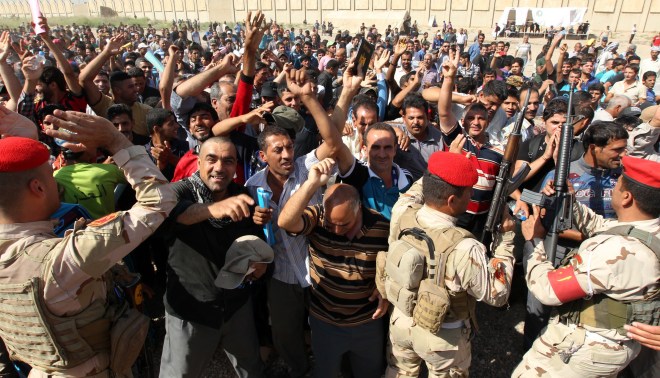Harith Hasan examines how Iraq’s Sunni population views ISIS:
Most Sunnis maintain their suspicious view of the Shiite-dominated government in Baghdad, but they do not see ISIS as a good alternative. It is true that ISIS has largely invested in the sectarian tension in Iraq and the region, but its objectives go beyond the Iraqi borders or the major concerns of Iraq’s Sunni community. Through its simultaneous involvement in Syria and Iraq, ISIS established its distinct entity and identity with an agenda that is largely indifferent to Iraqi politics.
However, fighting ISIS has yet to become a Sunni priority. One reason is the growing strength of the organization and its proven ability to carry out revenge against “traitors,” as was the case with the assassination of Khamis Abu Risha, a leader in the anti al-Qaeda awakening groups (Sahwa) which previously were a key voice in the anti-government rallies in Anbar. Second, the Sunni elite is divided and increasingly incapable of determining its communal priorities, and some of its members think that the main problem lies in the policies of Prime Minister Nouri al-Maliki’s government.
Joshua Landis offers an ominous prediction about the coming Shiite backlash:
I would not be shocked to see significant ethnic cleansing of Sunni neighborhoods in Baghdad should ISIS attack and give the Iraqi Army a run for its money.
After all, the Iraqi army is large, has helicopters, sophisticated intelligence capabilities, tanks, artillery and all the rest. They were caught napping and without esprit de corps, much as the Syrian army was. But capable officers will emerge who will strip down the “power-sharing” fat that the US built and rebuild it based on loyalty to Maliki and Shiism, if most of that has not been done already. This is what happened in Syria, when we saw the Syrian Army unravel at the base during the first year of the Sunni uprising. The Syrian military was quickly rebuilt along sectarian and regional lines to make it much stronger and more loyal, with locally recruited Iranian style National Defense Forces modeled on the Islamic Guard. If Sunnis choose to form such local militias and ally with the Shiite regime, so much the better. If they do not and choose to lay low until they figure out whether ISIS can win in their regions, the Shiites will go it alone and assume all Sunnis are a fifth column.
In an fascinating interview with Zack Beauchamp, Iraqi politics expert Kirk Sowell highlights the near-complete unviability of ISIS-controlled Iraq:
[T]here’s no money [in northwest Sunni Iraq]. All these provinces are dependent on Baghdad for their budgets. This is what held Iraq together all these years — it would have fallen apart years ago had it not been for this financial dependence. Anbar [an insurgent-controlled Sunni province] is totally dependent; over 95 percent of their money comes from Baghdad. They got a little bit of money from customs when they controlled the [Syrian] border, but they don’t even get that now. Ninevah [the insurgent-controlled province containing Mosul] is going to suffer a complete economic collapse. …
[E]ven if the insurgents had some oil, [which they don’t,] they couldn’t develop it. They’re able to make use of the Syrian oil infrastructure because it’s already developed; but to the extent that there are oil reserves in the insurgent-controlled territory they’re not developed. So there’s nothing to sell.
So in principle they could make their own state, but only if they’d be willing to starve. It’d be a permanent downward economic spiral — like Gaza, basically.
Meanwhile, Shireen T. Hunter argues that the most significant factor in Iraq’s political instability is “the inability of Iraq’s Sunni Arabs and its Sunni neighbors to come to terms with a government in which the Shias, by virtue of their considerable majority in Iraq’s population, hold the leading role.” She even claims that the Maliki government’s closeness to Iran was not so much a choice as a necessity after being isolated by the country’s Sunni neighbors:
In short, by exaggerating the sectarian factor, Iraq’s Sunni neighbors have exacerbated Shia fears and made it more difficult for them to pursue a more inclusive policy vis-à-vis the Sunnis. Further, most killings in Iraq have been in Shia areas, undertaken by Sunni extremists of various kinds who are funded by Sunni governments in the region. The plight of the Shias has also not been limited to Iraq. Similar mistreatment in Bahrain, Saudi Arabia, and Pakistan has gone unnoticed by the West, while the exclusion of Iraq’s Sunnis from leadership posts in Baghdad has been blown out of proportion. Western and especially US dislike of Iran has been a major cause for the disregarding of mass killings and assassination of Shias.
But Nussaibah Younis insists that most Sunni grievances are legitimate and must be treated seriously, especially now:
Iraqi Sunnis don’t want to be governed by Isis, they don’t support the massacre of Shia civilians and they don’t want another civil war. But they also don’t believe there is a place for them in Maliki’s Iraq. Iraq’s politicians must persuade them that a future does exist in which Sunnis can participate as equal citizens in an Iraqi state, and that this is something worth fighting for.
I glean from much of this that Obama’s caution is easily the smartest posture. ISIS may well have begun a process by which they are destroyed. And allowing your foes to self-destruct is a talent of the president’s over the years.
(Photo: Iraqi men, who volunteered to fight against the Jihadist militants, gather around buses in Baghdad, ahead of being transported for training at Taji infantry camp on the outskirts of Baghdad, on June 16, 2014, as security forces are bolstering defenses in the capital. By Sabah Arar/AFP/Getty Images.)
